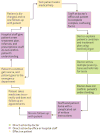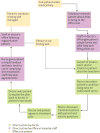New federal policy initiatives to boost health literacy can help the nation move beyond the cycle of costly 'crisis care'
- PMID: 22262723
- PMCID: PMC5102007
- DOI: 10.1377/hlthaff.2011.1169
New federal policy initiatives to boost health literacy can help the nation move beyond the cycle of costly 'crisis care'
Abstract
Health literacy is the capacity to understand basic health information and make appropriate health decisions. Tens of millions of Americans have limited health literacy--a fact that poses major challenges for the delivery of high-quality care. Despite its importance, health literacy has until recently been relegated to the sidelines of health care improvement efforts aimed at increasing access, improving quality, and better managing costs. Recent federal policy initiatives, including the Affordable Care Act of 2010, the Department of Health and Human Services' National Action Plan to Improve Health Literacy, and the Plain Writing Act of 2010, have brought health literacy to a tipping point-that is, poised to make the transition from the margins to the mainstream. If public and private organizations make it a priority to become health literate, the nation's health literacy can be advanced to the point at which it will play a major role in improving health care and health for all Americans.
Figures
Comment in
-
Health literacy through the National Library of Medicine.Health Aff (Millwood). 2012 May;31(5):1128. doi: 10.1377/hlthaff.2012.0378. Health Aff (Millwood). 2012. PMID: 22566460 No abstract available.
References
-
- Berkman ND, Sheridan SL, Donahue KE, Halpern DJ, Crotty K. Low health literacy and health outcomes: an updated systematic review. Ann Intern Med. 2011;155(2):97–107. - PubMed
-
- Rudd R. Improving Americans’ health literacy. N Engl J Med. 2010;363(24):2283–5. - PubMed
-
- Parker R, Ratzan SC. Health literacy: a second decade of distinction for Americans. J Health Commun. 2010;15(Suppl 2):20–33. - PubMed
-
- Institute of Medicine. Health literacy implications for health care reform: a workshop summary. Washington (DC): National Academies Press; 2011.
-
- Townzen D (Walmart; Bentonville, AR) Attributes of a health literate healthcare organization [Internet]. Presentation to: Institute of Medicine Roundtable on Health Literacy Attributes of a Health Literate Organization Workshop; 2011 Nov 16; Washington, DC. Washington, (DC): IOM; [cited 2012 Jan 10]. Available from: http://www.iom.edu/~/media/Files/Activity%20Files/PublicHealth/HealthLit....
MeSH terms
Grants and funding
LinkOut - more resources
Full Text Sources
Medical




